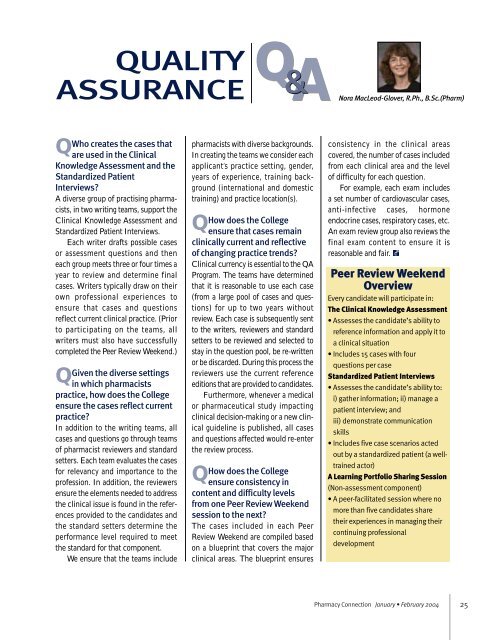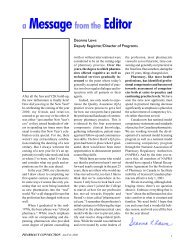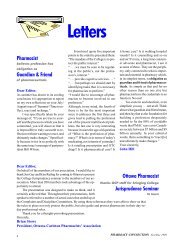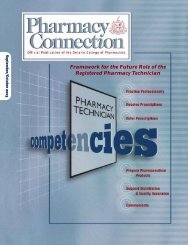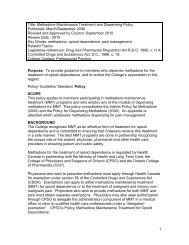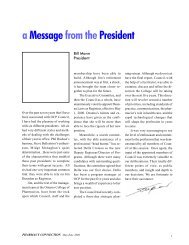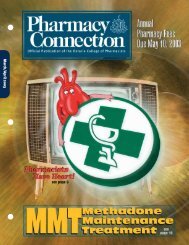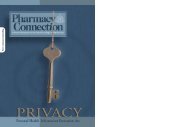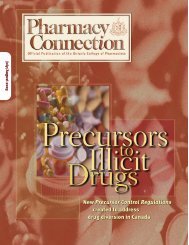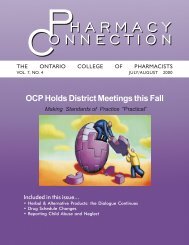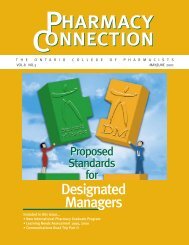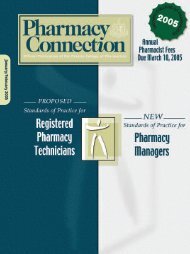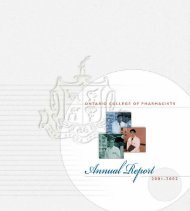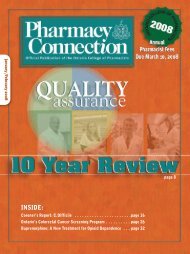January/February 2004 - Ontario College of Pharmacists
January/February 2004 - Ontario College of Pharmacists
January/February 2004 - Ontario College of Pharmacists
You also want an ePaper? Increase the reach of your titles
YUMPU automatically turns print PDFs into web optimized ePapers that Google loves.
QUALITY Q A<br />
ASSURANCE A&<br />
Nora MacLeod-Glover, R.Ph., B.Sc.(Pharm)<br />
Who creates the cases that<br />
Qare used in the Clinical<br />
Knowledge Assessment and the<br />
Standardized Patient<br />
Interviews?<br />
A diverse group <strong>of</strong> practising pharmacists,<br />
in two writing teams, support the<br />
Clinical Knowledge Assessment and<br />
Standardized Patient Interviews.<br />
Each writer drafts possible cases<br />
or assessment questions and then<br />
each group meets three or four times a<br />
year to review and determine final<br />
cases. Writers typically draw on their<br />
own pr<strong>of</strong>essional experiences to<br />
ensure that cases and questions<br />
reflect current clinical practice. (Prior<br />
to participating on the teams, all<br />
writers must also have successfully<br />
completed the Peer Review Weekend.)<br />
Given the diverse settings<br />
Qin which pharmacists<br />
practice, how does the <strong>College</strong><br />
ensure the cases reflect current<br />
practice?<br />
In addition to the writing teams, all<br />
cases and questions go through teams<br />
<strong>of</strong> pharmacist reviewers and standard<br />
setters. Each team evaluates the cases<br />
for relevancy and importance to the<br />
pr<strong>of</strong>ession. In addition, the reviewers<br />
ensure the elements needed to address<br />
the clinical issue is found in the references<br />
provided to the candidates and<br />
the standard setters determine the<br />
performance level required to meet<br />
the standard for that component.<br />
We ensure that the teams include<br />
pharmacists with diverse backgrounds.<br />
In creating the teams we consider each<br />
applicant’s practice setting, gender,<br />
years <strong>of</strong> experience, training background<br />
(international and domestic<br />
training) and practice location(s).<br />
How does the <strong>College</strong><br />
Qensure that cases remain<br />
clinically current and reflective<br />
<strong>of</strong> changing practice trends?<br />
Clinical currency is essential to the QA<br />
Program. The teams have determined<br />
that it is reasonable to use each case<br />
(from a large pool <strong>of</strong> cases and questions)<br />
for up to two years without<br />
review. Each case is subsequently sent<br />
to the writers, reviewers and standard<br />
setters to be reviewed and selected to<br />
stay in the question pool, be re-written<br />
or be discarded. During this process the<br />
reviewers use the current reference<br />
editions that are provided to candidates.<br />
Furthermore, whenever a medical<br />
or pharmaceutical study impacting<br />
clinical decision-making or a new clinical<br />
guideline is published, all cases<br />
and questions affected would re-enter<br />
the review process.<br />
How does the <strong>College</strong><br />
Qensure consistency in<br />
content and difficulty levels<br />
from one Peer Review Weekend<br />
session to the next?<br />
The cases included in each Peer<br />
Review Weekend are compiled based<br />
on a blueprint that covers the major<br />
clinical areas. The blueprint ensures<br />
consistency in the clinical areas<br />
covered, the number <strong>of</strong> cases included<br />
from each clinical area and the level<br />
<strong>of</strong> difficulty for each question.<br />
For example, each exam includes<br />
a set number <strong>of</strong> cardiovascular cases,<br />
anti-infective cases, hormone<br />
endocrine cases, respiratory cases, etc.<br />
An exam review group also reviews the<br />
final exam content to ensure it is<br />
reasonable and fair.<br />
Peer Review Weekend<br />
Overview<br />
Every candidate will participate in:<br />
The Clinical Knowledge Assessment<br />
• Assesses the candidate’s ability to<br />
reference information and apply it to<br />
a clinical situation<br />
• Includes 15 cases with four<br />
questions per case<br />
Standardized Patient Interviews<br />
• Assesses the candidate’s ability to:<br />
i) gather information; ii) manage a<br />
patient interview; and<br />
iii) demonstrate communication<br />
skills<br />
• Includes five case scenarios acted<br />
out by a standardized patient (a welltrained<br />
actor)<br />
A Learning Portfolio Sharing Session<br />
(Non-assessment component)<br />
• A peer-facilitated session where no<br />
more than five candidates share<br />
their experiences in managing their<br />
continuing pr<strong>of</strong>essional<br />
development<br />
Pharmacy Connection <strong>January</strong> • <strong>February</strong> <strong>2004</strong> 25


